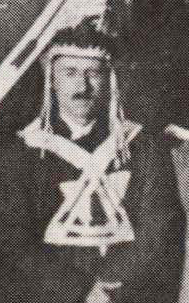Minsi Lodge in Reading, Pennsylvania on October 6 and 7th, 1922 hosted the second meeting of the Grand Lodge. There were seven lodges in attendance and 14 delegates. While the early Grand Lodge and National Lodge meetings were the precursors of today’s modern National Conferences, in the early years they much were more similar to a lodge or section executive meeting. They were business meetings, made up largely of Scout professionals and were not immune to politics.
The Second meeting of the Grand Lodge was at times contentious and political. At stake was determination of who would lead the Order as the second Grand Chieftain. There were two distinguished candidates.
The first was co-founder Carroll A. Edson, a logical follower to Goodman. Edson was there from the beginning, having worked side by side with Goodman in founding the Order as Assistant Camp Director at Treasure Island. He was the second Third Degree honoree and he was actively expanding the Order founding new lodges on what at the time was Wimachtendienk’s frontier in the Chicago area.
The second candidate was Grand Treasurer Arthur Schuck who later would best be known as a Chief Scout Executive of the BSA. Schuck was the first Third Degree (Vigil) Honor member outside of Unami Lodge and like Edson was a professional Scouter. Schuck was serving as the Scout Executive for the host council for the meeting.
In the early years the Grand Chieftain was determined by a vote of the lodges. Each lodge would receive one vote. As the roll call was taken, five lodges that had been present at the first meeting were present. In addition, the Grand Scribe announced that two new lodges had been formed in the previous year. One was the new lodge in Baltimore (This lodge is listed as “Naticahe Lodge”, “Naticoke Lodge” and the “Baltimore Lodge” in the minutes. It is what we now know as Nentico Lodge.) The second was a lodge described in the minutes as an outgrowth of Minsi Lodge (Schuck’s Lodge) in Harrisburg (today’s Susquehannock Lodge, although the name does not appear in the minutes). Schuck had found a new vote and appeared to have secured a 4-3 lead in the votes.
However, Edson chances were not over. The representative from Chicago presented a letter from Edson (who was not present at the meeting) that stated that there were now three lodges operating in Chicago and that Chicago should have two more votes. This would have given Edson a 5-4 lead in the vote. After much discussion it was determined that these two new votes would not be allowed, as the applications had not been received timely.
In what the minutes describe as “strenuous balloting”, Arthur A. Schuck was elected the second Grand Chieftain. W. Perry Bradley of the lodge from Baltimore was elected Grand Scribe and Bartram H. Dilks from Harrisburg the Grand Treasurer. E.R. Carrick was subsequently selected to serve in the new position of Grand Lodge Chief Supply Officer.
Ironically, the lodge formed by Schuck in Harrisburg that cast the vote that put Schuck himself over the top for Grand Chieftain was gone within a year. Its Scout Executive disbanded it before the next Grand Lodge Meeting.
2, Elections, National Event, OA, Scouting
